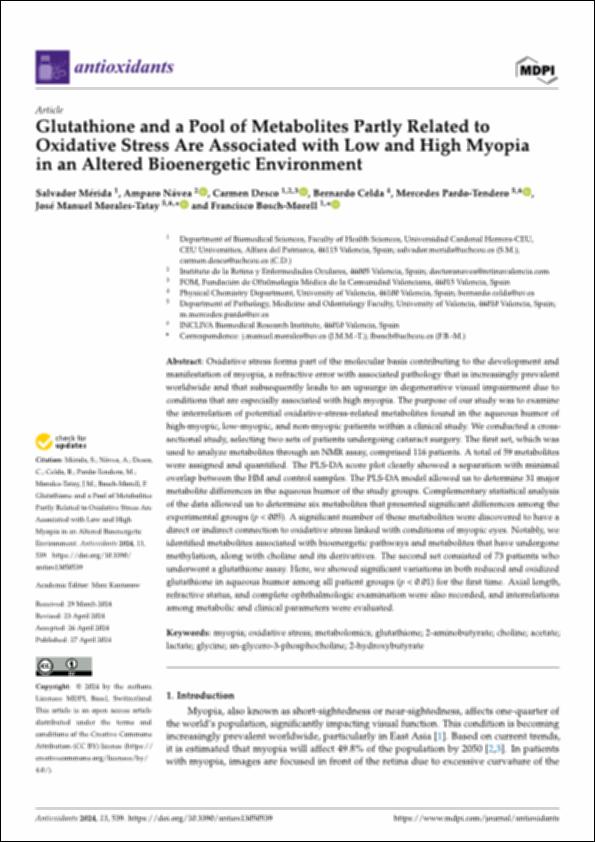Please use this identifier to cite or link to this item:
http://hdl.handle.net/10637/16029Glutathione and a pool of metabolites partly related to oxidative stress are associated with low and high myopia in an altered bioenergetic environment
| Title: | Glutathione and a pool of metabolites partly related to oxidative stress are associated with low and high myopia in an altered bioenergetic environment |
| Authors : | Mérida Donoso, Salvador Navea Tejerina, Amparo Desco Esteban, María Carmen Celda, Bernardo Pardo Tendero, Mercedes Morales Tatay, José Manuel Bosch Morell, Francisco |
| Keywords: | Miopía; Myopia; Estrés oxidativo; Oxidative stress; Glutatión; Glutathione; Antioxidantes; Antioxidants |
| Publisher: | MDPI |
| Citation: | Mérida, S., Návea, A., Desco, C., Celda, B., Pardo-Tendero, M., Morales-Tatay, J.M. & Bosch-Morell, F. (2024). Glutathione and a pool of metabolites partly related to oxidative stress are associated with low and high myopia in an altered bioenergetic environment. Antioxidants, vol. 13, i. 5 (27 apr.), art. 539. DOI: https://doi.org/10.3390/antiox13050539 |
| Abstract: | Oxidative stress forms part of the molecular basis contributing to the development and manifestation of myopia, a refractive error with associated pathology that is increasingly prevalent worldwide and that subsequently leads to an upsurge in degenerative visual impairment due to conditions that are especially associated with high myopia. The purpose of our study was to examine the interrelation of potential oxidative-stress-related metabolites found in the aqueous humor of high-myopic, low-myopic, and non-myopic patients within a clinical study. We conducted a cross-sectional study, selecting two sets of patients undergoing cataract surgery. The first set, which was used to analyze metabolites through an NMR assay, comprised 116 patients. A total of 59 metabolites were assigned and quantified. The PLS-DA score plot clearly showed a separation with minimal overlap between the HM and control samples. The PLS-DA model allowed us to determine 31 major metabolite differences in the aqueous humor of the study groups. Complementary statistical analysis of the data allowed us to determine six metabolites that presented significant differences among the experimental groups (p < 005). A significant number of these metabolites were discovered to have a direct or indirect connection to oxidative stress linked with conditions of myopic eyes. Notably, we identified metabolites associated with bioenergetic pathways and metabolites that have undergone methylation, along with choline and its derivatives. The second set consisted of 73 patients who underwent a glutathione assay. Here, we showed significant variations in both reduced and oxidized glutathione in aqueous humor among all patient groups (p < 0.01) for the first time. Axial length, refractive status, and complete ophthalmologic examination were also recorded, and interrelations among metabolic and clinical parameters were evaluated. |
| Description: | Este artículo pertenece al número especial "Cellular Responses of Antioxidants Related to Degenerative Eye Disease Research". |
| URI: | http://hdl.handle.net/10637/16029 |
| Rights : | http://creativecommons.org/licenses/by/4.0/deed.es Open Access |
| ISSN: | 2076-3921 (Electrónico) |
| Issue Date: | 27-Apr-2024 |
| Center : | Universidad Cardenal Herrera-CEU |
| Appears in Collections: | Dpto. Ciencias Biomédicas |
Items in DSpace are protected by copyright, with all rights reserved, unless otherwise indicated.


